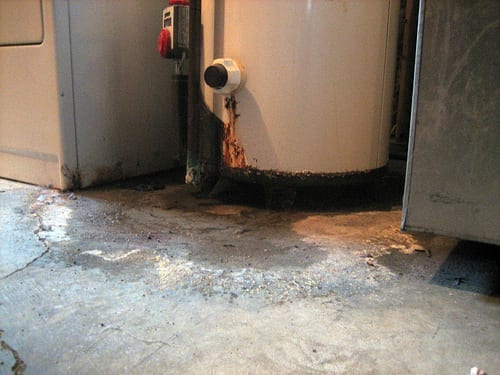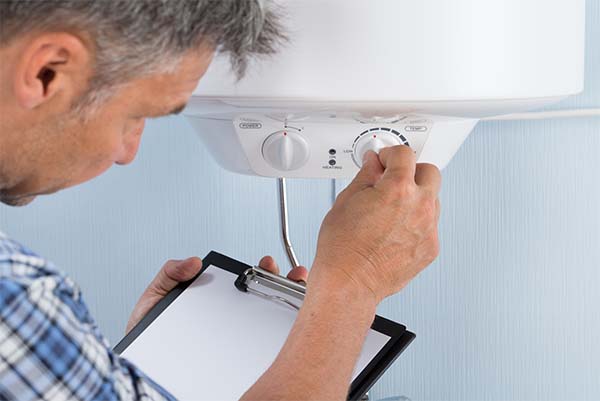Essential Recommendations for Homeowners Handling Malfunctioning Water Heaters
Essential Recommendations for Homeowners Handling Malfunctioning Water Heaters
Blog Article
We've discovered this great article relating to How to Avoid a Broken Hot Water Heater directly below on the internet and figured it made good sense to write about it with you on this page.

Whether it is located in the basement or a separate space, broken water heaters can cause stress and anxiety. A common device holds 80 gallons, so an over night leak will bring about a flooding. This leads to major building damage with soaked wall surfaces and floorings. Having no hot water supply is also bothersome. If you are dealing with these issues, bear in mind of the following:
Call the Plumber
After doing the first 2 safety and security actions, you need to call your plumber to find as soon as possible to take care of a burst water heater. Remember that your system will not simply conk out dramatically overnight. There are normally indicators that your aging water heater has sediment build-up in the interior. Make note of the following:
Do not wait on significant flooding to call the plumber. By then, you will certainly have to invest more to restore your residential property. Instead, as soon as you detect these indications, have a professional involved examine your water heater container. Usually, water heaters have a life-span of about 8 to 12 years. With normal assessment and upkeep, you can prolong its life.
Cut Off the Cold Water Supply
Cut off the containers faucet water supply from the resource. This goes from your major water line into the container. When your container is in good condition, the cold water quits filling out when the container is complete. However since it is dripping, the water will remain to move. Shut the valve found at the top of the heater. Rotate this clockwise to shut it off. You must transform off that primary water supply line outside your residential or commercial property if you can not find it or reach it.
Shut Off Power Source
Prior to calling the plumber, closed off a gas water heating unit by turning the temperature level dial. This will certainly avoid electrocution, especially if there is a leakage as water is a conductor. Normally, the heating component shuts off when the water strikes a certain temperature.
Tidy up Home
After calling the plumber, file damages by taking notes and also images so you can claim your property owner's insurance coverage. Get rid of any kind of standing water to protect against mold and mildew and also mold growth. If you have a submersible water pump, use that to drain pipes the water.
Keep in mind, if you notice any type of issues with your hot water heater, call the pros right now. You can not take this trouble lightly due to the fact that a defective thermostat can elevate water temp to a precariously high degree, resulting in unintended burns. A damaged heater stress relief valve can additionally trigger an explosion. For ideal outcomes, obtain a yearly check so your device gets checked, cleansed, drained, and refilled, assuring ideal performance.
After doing the first two security actions, you must call your plumber to come right away to repair a burst water heating system. Rather, as soon as you find these indications, have actually an expert come to evaluate your water heating system container. Prior to calling the plumber, closed off a gas water heating system by transforming the temperature level dial. If you have a completely submersible water pump, utilize that to drain the water. Keep in mind, if you discover any concerns with your water heating system, call the pros right away.
Is My Water Heater Broken?
The Water Heater is Old
No appliance will last forever. This includes a home’s water heater. During its lifespan, residents are going to face a situation where a new water heater installation will be necessary. The biggest problem with this is that most people are not sure when their water heater expires. Not knowing this can lead to serious risks if the unit begins to act up due to old age.
Most makes and models of water heaters will last between eight and 10 years. While 10 years is the age when water heater replacement is highly recommended, the need to replace the unit may occur before this time or after. If the unit doesn’t show any symptoms of a problem, it is a good idea to replace it at the 10-year mark (from the manufacture date).
Some of the symptoms that indicate a new unit is needed include rusting, leaks, noises, and a failure to heat up the water. Also, note that not all units have a 10-year life expectancy. The main exception to this rule is that a gas unit will last for six to eight years.
Rusty Heater Inlet Valve or Water
While steel is the strongest material on earth, it does have a weakness – rust. If corrosion occurs on a steel surface, it will begin to spread and eat through the steel in certain areas. On water tanks and pipes that are made of steel, rust is a warning sign of an impending leak.
The issue for many is trying to figure out if the rust is coming from the water heater or the pipes that lead to the faucet. If rust is seen, it is a clear indication that water heater service from the professionals is needed.
If rusty water appears out of the faucets in the bathtub or sink, it likely means a rusty water heater. If there is rust near the water inlet or the pressure relief valve, rust has likely developed inside the tank. If tap water appears rusty, it may be an issue with the pipes.
Strange Sounds from the Water Heater
Are there strange sounds coming from the tank? As a water heater gets older, rumbling noises may develop and get louder and louder as the water in the tank heats up. In homes where large amounts of hot water are used, the issue is likely going to be even more obvious when more serious issues arise. If there is a strange or loud noise coming from the unit, it is probably because of sediment buildup. A good way to remedy this problem is by flushing the heater. If this does not work, then a new unit may need to be installed.
Leaks
As a water heater gets closer to the end of its useful life, there is a higher chance there will be water around the tank. If there is water, this usually means leaks are occurring. Based on where the unit is located in the home, a leak may result in serious property damage.
Leaks are usually caused by expansions in the metal tank. The expansions occur as time passes and as the inside body of the tank is exposed to multiple heating cycles per day. When a fracture forms, the gap will be slight enough to hold the water in; however, in more serious situations, this will not be the case. If the tank is idle, the water will not leak but when the metal expands during each heating system, small amounts of water will get through the gap.

I hope you enjoyed our section on What Do You Do When Your Water Heater Bursts?. Thanks a ton for finding the time to read our short article. Appreciated our post? Please share it. Help others discover it. Many thanks for your time. Visit us again soon.
Plumbing emergency? We're ready. Report this page